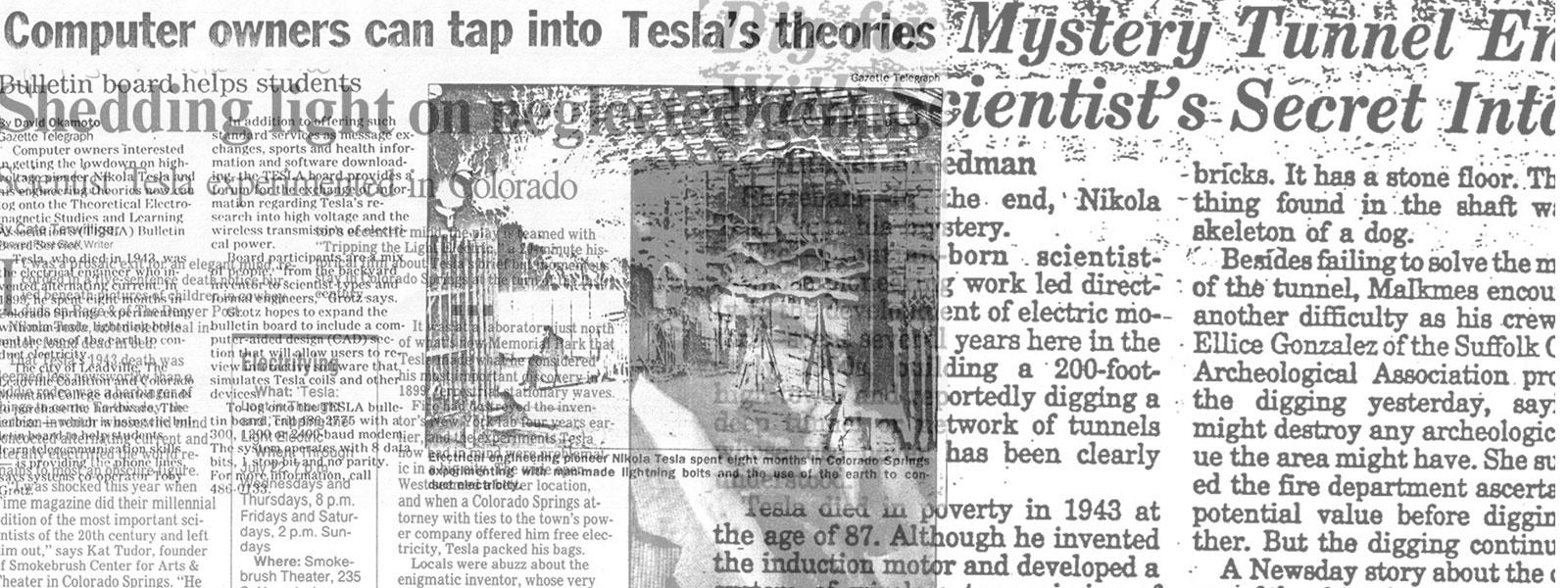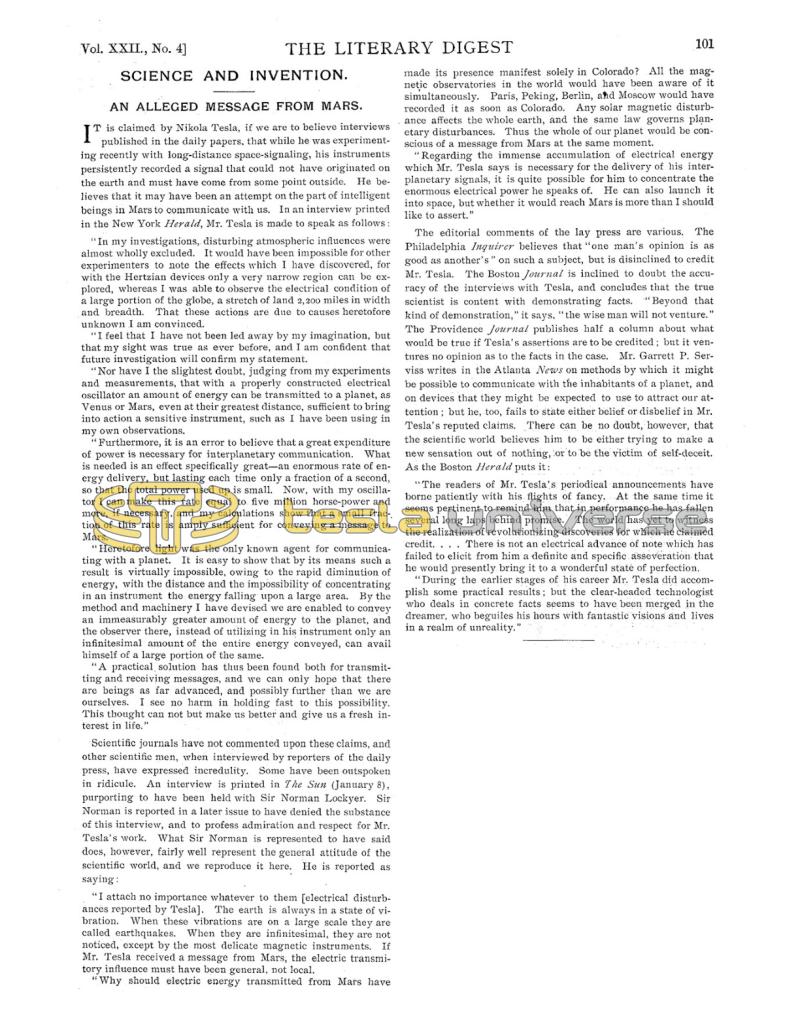
Nikola Tesla Articles
An Alleged Message from Mars
It is claimed by Nikola Tesla, if we are to believe interviews published in the daily papers, that while he was experimenting recently with long-distance space-signaling, his instruments persistently recorded a signal that could not have originated on the earth and must have come from some point outside. He believes that it may have been an attempt on the part of intelligent beings in Mars to communicate with us. In an interview printed in the New York Herald, Mr. Tesla is made to speak as follows:
"In my investigations, disturbing atmospheric influences were almost wholly excluded. It would have been impossible for other experimenters to note the effects which I have discovered, for with the Hertzian devices only a very narrow region can be explored, whereas I was able to observe the electrical condition of a large portion of the globe, a stretch of land 2,200 miles in width and breadth. That these actions are due to causes heretofore unknown I am convinced.
"I feel that I have not been led away by my imagination, but that my sight was true as ever before, and I am confident that future investigation will confirm my statement.
"Nor have I the slightest doubt, judging from my experiments and measurements, that with a properly constructed electrical oscillator an amount of energy can be transmitted to a planet, as Venus or Mars, even at their greatest distance, sufficient to bring into action a sensitive instrument, such as I have been using in my own observations.
"Furthermore, it is an error to believe that a great expenditure of power is necessary for interplanetary communication. What is needed is an effect specifically great - an enormous rate of energy delivery, but lasting each time only a fraction of a second, so that the total power used up is small. Now, with my oscillator I can make this rate equal to five million horse-power and more, if necessary, and my calculations show that a small fraction of this rate is amply sufficient for conveying a message to Mars.
"Heretofore light was the only known agent for communicating with a planet. It is easy to show that by its means such a result is virtually impossible, owing to the rapid diminution of energy, with the distance and the impossibility of concentrating in an instrument the energy falling upon a large area. By the method and machinery I have devised we are enabled to convey an immeasurably greater amount of energy to the planet, and the observer there, instead of utilizing in his instrument only an infinitesimal amount of the entire energy conveyed, can avail himself of a large portion of the same.
"A practical solution has thus been found both for transmitting and receiving messages, and we can only hope that there are beings as far advanced, and possibly further than we are ourselves. I see no harm in holding fast to this possibility. This thought can not but make us better and give us a fresh interest in life."
Scientific journals have not commented upon these claims, and other scientific men, when interviewed by reporters of the daily press, have expressed incredulity. Some have been outspoken in ridicule. An interview is printed in The Sun (January 8), purporting to have been held with Sir Norman Lockyer. Sir Norman is reported in a later issue to have denied the substance of this interview, and to profess admiration and respect for Mr. Tesla's work. What Sir Norman is represented to have said does, however, fairly well represent the general attitude of the scientific world, and we reproduce it here. He is reported as saying:
"I attach no importance whatever to them [electrical disturbances reported by Tesla]. The earth is always in a state of vibration. When these vibrations are on a large scale they are called earthquakes. When they are infinitesimal, they are not noticed, except by the most delicate magnetic instruments. If Mr. Tesla received a message from Mars, the electric transmitory influence must have been general, not local.
"Why should electric energy transmitted from Mars have made its presence manifest solely in Colorado? All the magnetic observatories in the world would have been aware of it simultaneously. Paris, Peking, Berlin, and Moscow would have recorded it as soon as Colorado. Any solar magnetic disturbance affects the whole earth, and the same law governs planetary disturbances. Thus the whole of our planet would be conscious of a message from Mars at the same moment.
"Regarding the immense accumulation of electrical energy which Mr. Tesla says is necessary for the delivery of his interplanetary signals, it is quite possible for him to concentrate the enormous electrical power he speaks of. He can also launch it into space, but whether it would reach Mars is more than I should like to assert."
The editorial comments of the lay press are various. The Philadelphia Inquirer believes that "one man's opinion is as good as another's" on such a subject, but is disinclined to credit Mr. Tesla. The Boston Journal is inclined to doubt the accuracy of the interviews with Tesla, and concludes that the true scientist is content with demonstrating facts. "Beyond that kind of demonstration," it says, "the wise man will not venture." The Providence Journal publishes half a column about what would be true if Tesla' s assertions are to be credited; but it ventures no opinion as to the facts in the case. Mr. Garrett P. Serviss writes in the Atlanta News on methods by which it might be possible to communicate with the inhabitants of a planet, and on devices that they might be expected to use to attract our attention; but he, too, fails to state either belief or disbelief in Mr. Tesla's reputed claims. There can be no doubt, however, that the scientific world believes him to be either trying to make a new sensation out of nothing, or to be the victim of self-deceit. As the Boston Herald puts it:
"The readers of Mr. Tesla's periodical announcements have borne patiently with his flights of fancy. At the same time it seems pertinent to remind him that in performance he has fallen several long laps behind promise. The world has yet to witness the realization of revolutionizing discoveries for which he claimed credit. ... There is not an electrical advance of note which has failed to elicit from him a definite and specific asseveration that he would presently bring it to a wonderful state of perfection.
"During the earlier stages of his career Mr. Tesla did accomplish some practical results; but the clear-headed technologist who deals in concrete facts seems to have been merged in the dreamer, who beguiles his hours with fantastic visions and lives in a realm of unreality."
